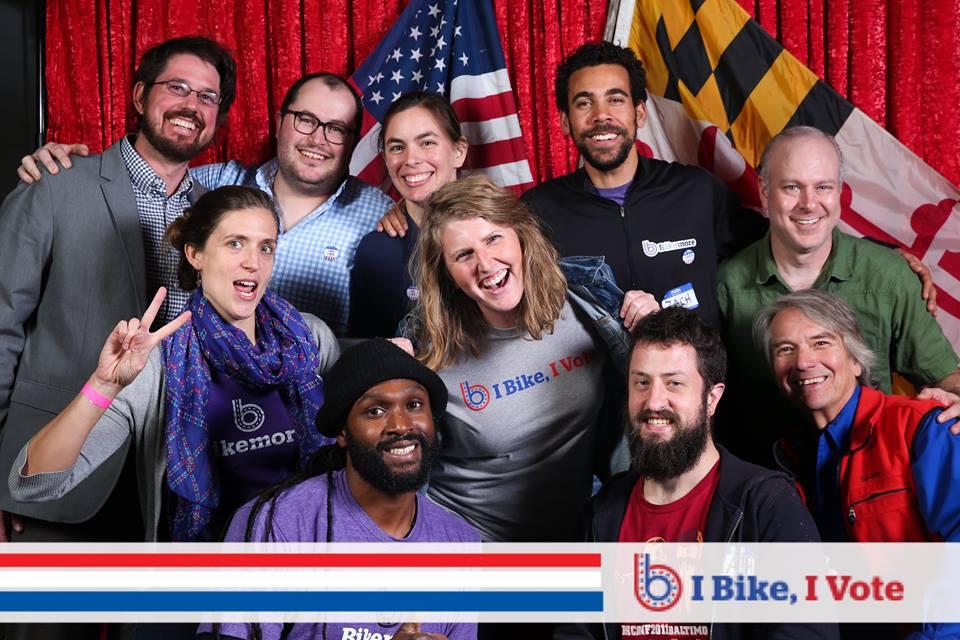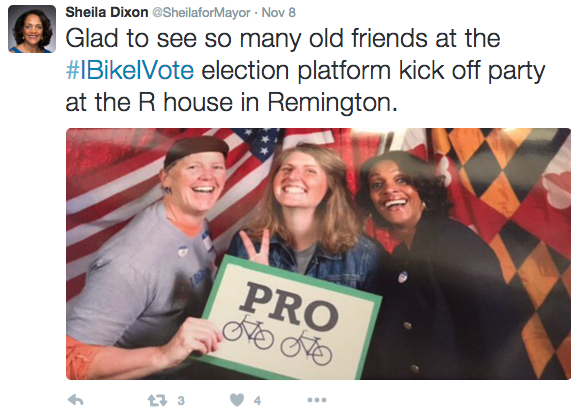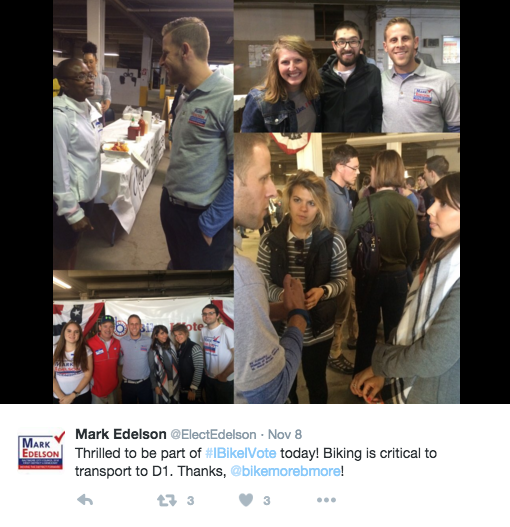
“Baltimore has an opportunity in 2016 to bring about significant political change,” Liz Cornish, executive director of Bikemore, told the roughly 200 bicyclists and multi-modal transportation activists gathered Sunday at R. House, a planned food hall under renovation in Remington. “But it is not enough to be informed [about bicycling issues], we actually have to be shaping the conversation, which is what we are doing here today.”
The two-hour afternoon event marked the kickoff of Bikemore’s yearlong, “I Bike, I Vote,” campaign, designed to encourage bicyclists not only to vote, but become advocates and help create political support for safe bicycling infrastructure and policy in the city as well.
About a dozen City Council candidates and most of the leading mayoral candidates—state Sen. Catherine Pugh, Councilman Nick Mosby, former mayor Sheila Dixon, and Maryland Attorney General’s Office appointee Elizabeth Embry—attended the meet-and-greet. (In fact, one presidential candidate, 2012 Green Party nominee Jill Stein, who is running again in 2016 and gave the keynote at Baltimore Green Assembly, also Sunday, turned up.) Monument City Brewing Company provided the beer, T-Blocks offered indoor bike parking, Side A Photography placed a photo booth, and Bikemore displayed information on local bicycling projects. Cornish laid out the nonprofit’s 2016 election platform, which includes supporting candidates “who understand a third of Baltimore lacks access to a car, and that improving access to public and active transportation is the only clear path to upward mobility for Baltimore’s poor.”

Recent studies have linked geographic mobility to economic mobility and a lack of transportation access to higher rates of unemployment and lower incomes.
Cornish drew big applause when she said that Bikemore also supports candidates “who will hold public agencies accountable so bicycle infrastructure is built on time and to spec the first time by competent contractors, and is subsequently maintained in a regular maintenance program.”
Recent Baltimore City bicycling infrastructure plans, including the extension of the Jones Falls Trail, Charm City Bikeshare, the Maryland Avenue cycle track, and the Downtown Bicycle Network have been beset by years of delay. In the process, Baltimore has fallen behind cities across the country, in terms of building safe bicycling infrastructure and growing the city’s percentage of bicycle commuters. The entire Bikemore 2016 election platform can be found here.
Mosby, who recently announced his campaign for the city’s highest office, said he has supported Bikemore’s efforts in the past and will continue to do so, adding that improving bicycle infrastructure is needed help the city’s low-income population that can’t afford a car—and attract and keep a growing Millennial Generation workforce. He said the blame for the city’s failure to improve its bicycle infrastructure falls squarely on City Hall leadership that has failed to make it a priority and hold the city’s bureaucracy accountable to timelines.
“In terms of multi-modal infrastructure, we’ve fallen behind,” Mosby said. “We are on either on our third or fourth attempt to launch Charm City Bikeshare.” Mosby also highlighted the modest start-up nature of Baltimore’s bikeshare initiative—just 250 bikes—while Washington, D.C.’s Capital Bikeshare program has grown to more than 3,000 bicycles at 350 stations over the past few years.
Embry, who announced her campaign last week, said she used to bike commute from her Waverly home to City Hall when she was employed in the Mayor’s Office of Criminal Justice. “I have to look into the details [of Bikemore’s positions], but I support the principles of their platform,” Embry said.
Three candidates to replace District 1 City Councilman Jim Kraft—Zeke Cohen, Mark Edelson, and Mark Parker—were all on hand. Traffic and transportation mobility are major issues, in particular, in the historic, southeast neighborhoods of Canton, Fells Point, and Highlandtown where ongoing development in nearby Harbor East, Harbor Point, and Canton Crossing has pushed congestion to new levels of frustration for residents.
“It can be a challenge to build bikeable and walkable streets—these are old neighborhoods—but adding more parking and more cars isn’t sustainable,” Cohen said. “Not from an environmental perspective and not from a traffic and congestion perspective.”
Parker, a pastor who grew up in Otterbein and biking around the city, said he gave up his car two years ago. “I live two blocks from the church and I didn’t need it,” Parker said. “
Every meeting I go to [in Southeast], traffic is what I hear about. There’s no more room for cars in the street and bicycling has to be an option.”
